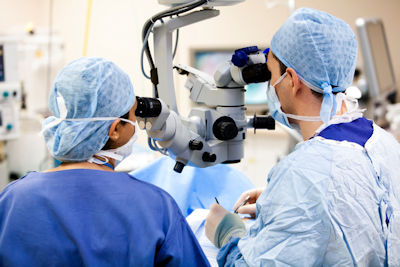Are Cataracts Hereditary?
If several members of your family have had cataracts, you may be wondering if they are hereditary. Read on for the answer from the experts at Elmquist Eye Group.
- Meet board certified ophthalmologist and surgeon Yasaira Rodriguez, MD
- Meet board certified optometrist (and managing partner) Kate Wagner, OD
- Meet board certified optometrist Nina Burt, OD
What are Cataracts?

Cataracts are cloudy areas in the normally clear lens of the eye, the part of the eye responsible for focusing light and producing clear, sharp images.
A normally clear lens allows light to pass through the back of the eye, enabling us to see well-defined images. If the lens becomes cloudy, light will not pass through easily and our vision becomes blurry. Patients often describe it as looking through a fogged-up window.
According to the American Academy of Ophthalmology, cataracts affect one in six Americans over the age of 40. By age 80, more than half of all Americans will have a cataract in one or both eyes or will had a cataract removed.
As we age, all of us are at risk for developing cataracts, but researchers believe the chances of developing cataracts may be higher if you have close relatives who have had cataracts than for individuals with no such family history.
You are also at an increased risk of cataracts if you have diabetes or smoke. Other risk factors include prolonged exposure to ultraviolet sunlight, a serious eye injury, or prolonged use of steroids.
How are Cataracts Treated?
Cataracts cannot be treated with medicines, vitamins or eye drops. Surgery is the only proven treatment.
Elmquist Eye Group is proud to offer refractive laser-assisted cataract surgery, a procedure that is designed to make surgery more precise, safer and more accurate. Utilizing this laser technology enables Dr. Rodriguez to plan and customize each cataract procedure to the unique characteristics of each patient’s eye.
During cataract surgery, the clouded lens is removed and replaced with a customized, artificial lens called an intraocular lens (IOL). There are multifocal IOLs available to help individuals see at all distances without the need for glasses, and special Toric lenses for people with astigmatism.
Cataract surgery is one of the safest and most highly perfected surgical procedures in medicine, with a 95% success rate. Of course, as with any surgery, risks do exist and should be discussed with your Elmquist eye doctor before the procedure.
To learn more about hereditary cataracts and explore your options for cataract surgery in Southwest Florida, get in touch with Elmquist Eye Group by calling (239) 936-2020. We offer you a unique combination of advanced eye care and a passion for providing the highest level of service.
